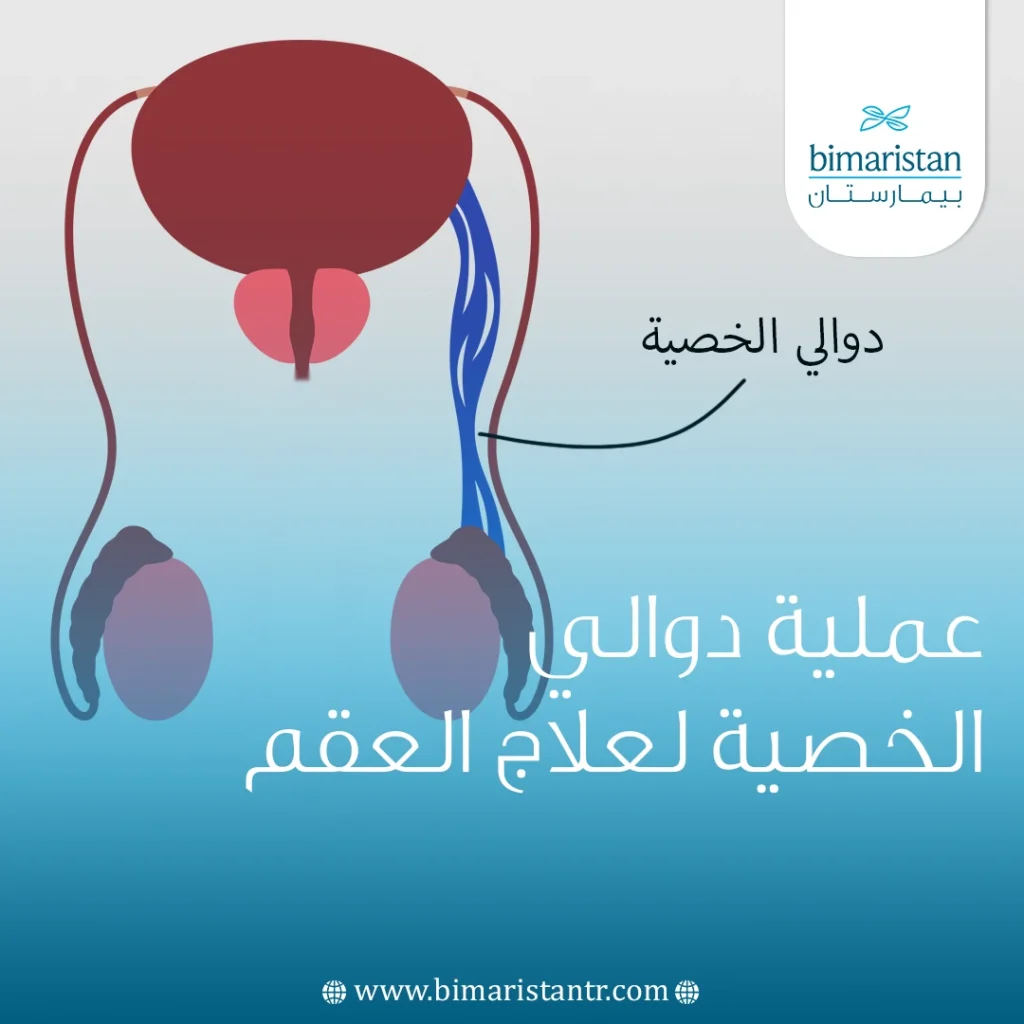عملية دوالي الخصية لها دور مهم في علاج العقم وتحسين الخصوبة عند عدد كبير من الرجال، حيث تعد الدوالي في الخصيتين مسؤولة عن أكثر من 40% من حالات عقم الذكور.
ساهمت عملية استئصال دوالي الخصية بزيادة فرص الإنجاب عند الذكور المصابين بالعقم بنسبة تزيد عن 70% مما كانت عليه قبل العملية، إذ تعد جراحة دوالي الخصيتين من أكثر العمليات الجراحية التي يتم إجرائها لعلاج العقم عند الرجال.
تعد دوالي الخصية Varicocele من المشاكل الشائعة التي تصيب الرجال حول العالم، فقد أشارت الدراسات الإحصائية إلى أن 15% من الذكور سوف يعانون من دوالى الخصية، ولحسن الحظ فإن الدوالي يمكن علاجها والتخلص منها عبر إجراء عمل جراحي يهدف لاستئصال وقطع توسعات الأوردة، إذ يتوفر بالوقت الحالي في تركيا تقنيات متطورة طفيفة التوغل لإجراء جراحة دوالي الخصيتين بدون وجود خطر كبير لحدوث مضاعفات جانبية، تابع معنا لتتعرف على كل ما تريده عن عملية دوالي الخصية.
ما هي دوالي الخصية؟
حتى نفهم كيفية تأثير دوالي الخصية على القدرة الإنجابية للذكر يجب أولاً معرفة ماهية الدوالي وماذا نقصد بها.
حقيقةً إن مصطلح “الدوالي” أو “القيلة الدوالية” يشير إلى توسع أو تورم في الأوردة الدموية الموجودة في كيس الصفن (الكيس اللحمي الذي توجد به الخصيتين).
تعمل أوردة الصفن على نقل الدم من خصيتيك باتجاه القلب وتقوم عبر ذلك بتنظيم درجة حرارة الخصيتين وذلك لأن عملية إنتاج السائل المنوي تحتاج إلى حرارة أقل بـ 3 درجات من حرارة الجسم الطبيعية، عند الإصابة بدوالي الخصية تختل آلية تنظيم الحرارة وبالتالي يصبح إنتاج نطاف طبيعي ذو جودة عالية أمراً صعباً مما يتسبب بالعقم،
اقرأ أكثر حول: طرق علاج العقم عند الرجال.
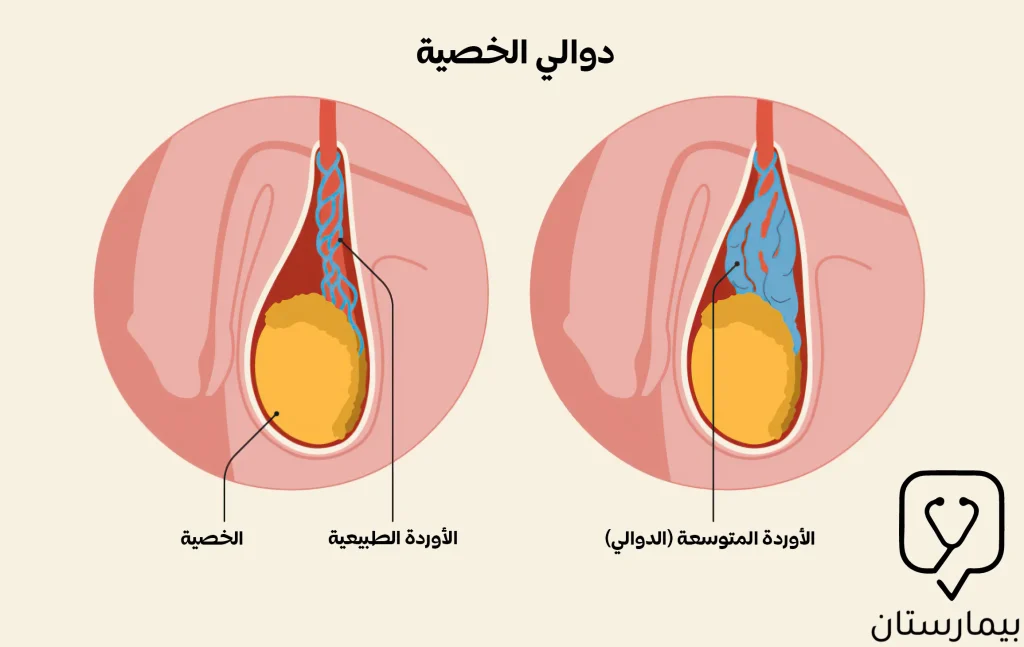
متى يتم إجراء عملية دوالي الخصية؟
بدايةً فإن عملية دوالي الخصية لا تجرى لجميع المصابين بالدوالي بل يحتفظ بالعملية لبعض الحالات التي تظهر عليها الأعراض فقط، بمعنى أن فئة كبيرة من الرجال قد يوجد لديهم دوالي بالخصية إلا أن هذه الدوالي لا تسبب لهم أية أعراض ومشاكل ويتمتعون بخصوبة جيدة دون إدراكهم حتى بوجود الدوالي.
تظهر الحاجة لإجراء جراحة دوالي الخصية عندما يعاني الرجل من أعراض ناتجة عن وجود الدوالي في الخصية كالإحساس بألم أو عدم ارتياح حول منطقة العانة بالإضافة إلى معاناته من العقم الناتج عن وجود هذه الدوالي، وقد تؤثر أيضاً دوالي الخصية على إنتاج هرمون الذكورة (التستوسترون) مما يتسبب بالعديد من الأعراض المزعجة للرجال.
عند حدوث الدوالي بسن باكر قد يحصل تأخر في البلوغ عند اليافع ويستطب هنا التداخل الجراحي لعلاج حالة الدوالي حتى يحدث البلوغ بالعمر الطبيعي عند الذكر وتنضج أعضائه التناسلية.
كيف تجرى عملية دوالي الخصية في تركيا؟
يوجد حالياً طرق عدة يتم عبرها اجراء عملية دوالي الخصيتين، فقد تتم العملية بواسطة المنظار الجراحي الذي يتميز بأنه إجراء قليل الخطورة ولا يحتاج لشقوق جراحية كبيرة، كما أن التعافي بعده لا يستغرق وقتاً طويلاً.
قد تجرى جراحة دوالي الخصية بالميكروسكوب الجراحي، لنناقش تفاصيل أكثر عن أنواع عمليات دوالي الخصية:
عملية دوالي الخصية بالمنظار
في هذا النوع من عمليات الدوالي يتم علاج دوالي الخصية عبر استخدام منظار مخصص مجهز بكاميرا تسمح للطبيب بالحصول على رؤية واضحة لدوالي الخصيه. يقوم الجراح بإدخال المنظار عبر عمل شق جراحي صغير في منطقة البطن ليتم إدخال المنظار وتوجيهه بدقة عبر شاشة فيديو حتى الوصول لمنطقة الدوالي.
يعمل الجراح باستخدام أدوات جراحية على قطع الأوردة المتوسعة (الدوالي) وإغلاق نهايات الأوردة المقطوعة عبر استعمال مشابك صغيرة أو عن طريق التخثير الحراري، بعد الانتهاء من ذلك يتم سحب الأدوات الجراحية والمنظار وإغلاق شق العملية الصغير.
تتميز هذه العملية بأنها قليلة الخطورة وطفيفة التوغل بالمقارنة مع الجراحة التقليدية المفتوحة بالإضافة لأنها تجرى بوقت قصير؛ حيث ينتهي الإجراء بشكل وسطي خلال 40 دقيقة ويتعافى المريض بسرعة ويتمكن من العودة لممارسة نشاطاته اليومية ولا يحتاج لفترة راحة طويلة بعد العملية.
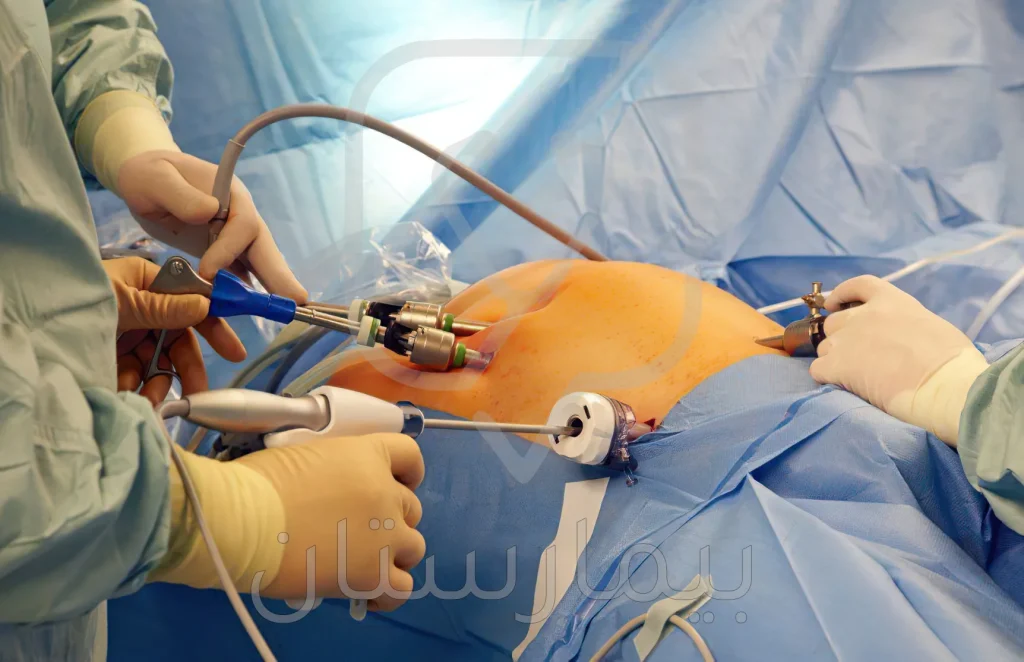
عملية دوالي الخصية بالميكروسكوب
في هذا النوع من جراحات دوالي الخصية يقوم الجراح بعمل شق جراحي فوق كيس الصفن بطول 1 سم ومن ثم بمساعدة الميكروسكوب (المجهر) يربط الأوردة الصغيرة المتوسعة ببعضها ويحرص على تجنب أذية الأسهر (الأنبوب الناقل للنطاف) أو شريان الخصية وكذلك الأوعية اللمفاوية وغيرها من البنى المهمة التي تحيط بالخصيتين.
يمكن إجراء هذه العملية داخل العيادة الخارجية للطبيب أو في المستشفى وعادة ما تستغرق جراحة دوالي الخصية المجهرية من 2 إلى 3 ساعات ويستطيع الشخص العودة لمنزله بذات اليوم الذي جرت به الجراحة.
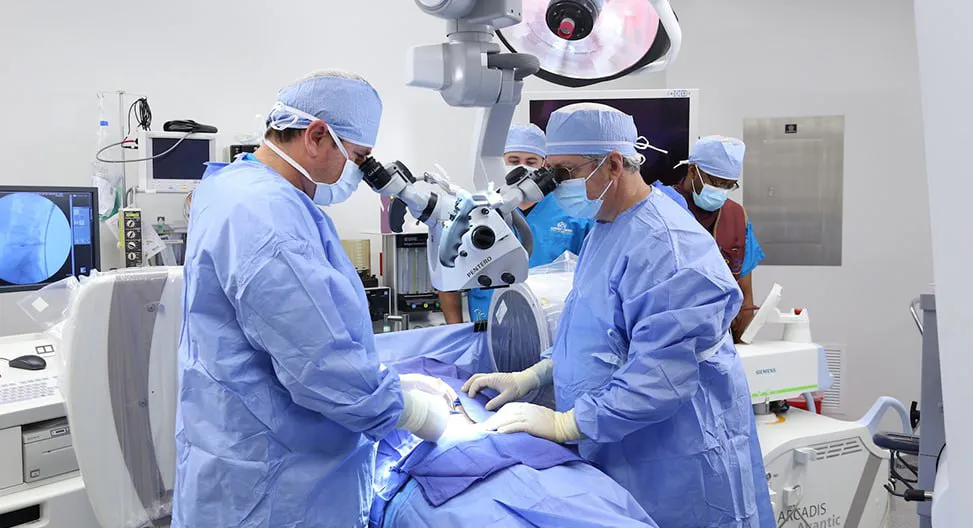
عملية دوالي الخصية بالجراحة المفتوحة
أثناء إجراء العملية المفتوحة لدوالي الخصية يلجأ الطبيب الجراح لعمل شق جراحي واسع حتى يتمكن من رؤية دوالى الخصية ويقوم باستئصالها يدوياً ويعيد ربط النهايات ببعضها، قد تُجرى هذه العملية بعدة طرق منها:
الربط الإربي Inguinal ligation
بهذا النوع من التداخلات الجراحية يصل الجراح للدوالي من خلال القناة الإربية والتي توجد في منطقة العانة بالقرب من أسفل البطن، يتم بعدها إستئصال وربط دوالي الخصية.
التداخل تحت الإربي Subinguinal ligation
يصل الجراح للدوالي من خلال الفخذ أسفل الرباط الاربي ومن ثم يربط دوالي الخصيتين ويعيد وصل نهايات الأوردة.
التداخل من الأعلى خلف الصفاق Retroperitoneal high ligation
يجري الشق الجراحي بمنطقة خلف البريتوان (غشاء مائي شفاف بالبطن) ويتم علاج الدوالى وربطها كما هو الحال بالعمليات السابقة.
على الرغم من اختلاف التكنيك الجراحي إلا أن الهدف يبقى واحد وهو علاج دوالي الخصية واستئصالها إذ يعود اختيار الطريقة المناسبة للجراح الذي سيقوم بالعملية.
عملية دوالي الخصية بالقسطرة
هذا الاجراء ليس شائعًا بكثرة إلا أنه قد يستخدم ببعض الحالات، ينطوي علاج الدوالي عبر القسطرة على تحويل تدفق الدم بعيداً عن الأوردة المتوسعة (الدوالي) وذلك لمنع زيادة توسع الأوردة والذي يؤدي إلى تفاقم شدة الأعراض.
قد يستخدم أخصائي الأشعة وسائل عديدة من أجل إطلاق خثرة في الأوردة المتوسعة بالخصية كاستخدام التصميم الحراري من خلال التداخل عن طريق أوعية الفخذ.
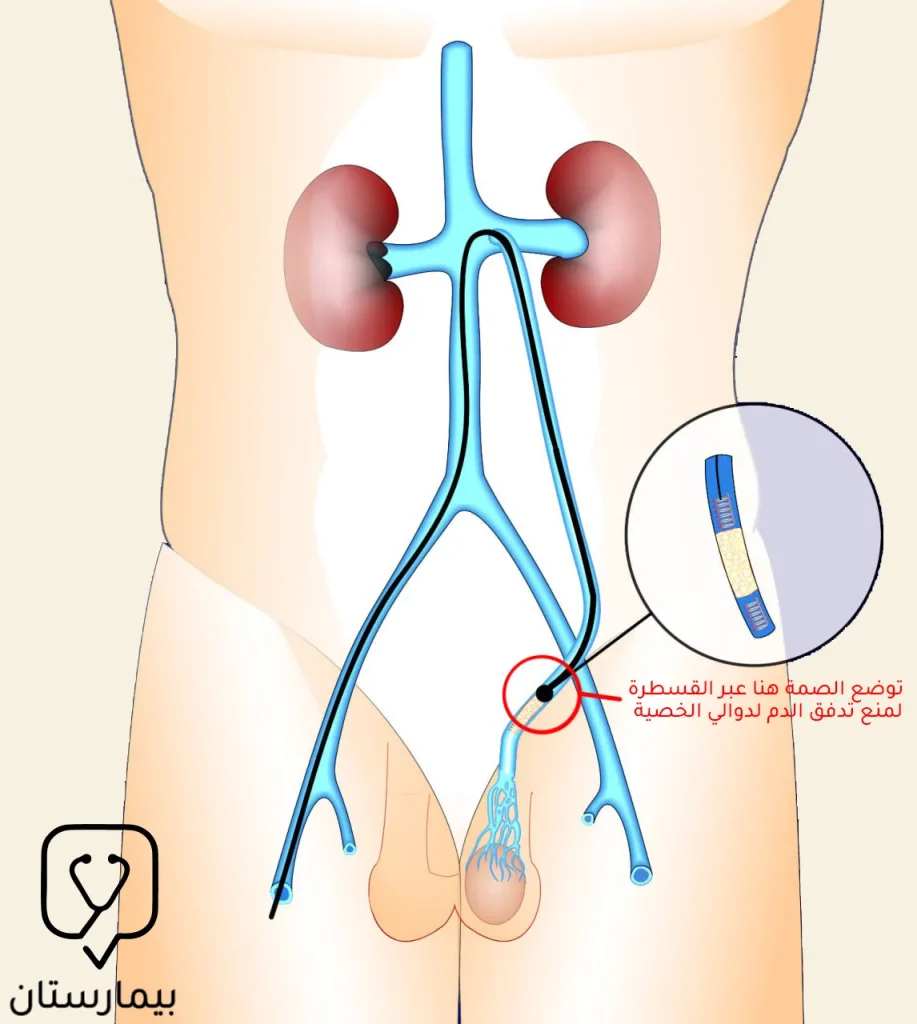
نصائح قبل عملية دوالي الخصية
بعد ترشيحك لعملية دوالي الخصية يجب عليك اتباع التعليمات والنصائح التي يخبرك بها طبيبك قبيل الإجراء ومن بين هذه النصائح ما يلي:
- أخبر طبيبك عن كافة الأدوية والمكملات الغذائية التي تقوم بأخذها فقد يطلب منك تعديل أو إيقاف بعض الادوية
- سيطلب منك الطبيب التوقف عن تناول الطعام أو الشراب قبل الاجراء بفترة محددة وعادةً ما تكون قبل 12 ساعة من عمليتك، من الضروري الالتزام بتعليمات طبيبك بشكل دقيق لتجنب حدوث تأثيرات جانبية للعملية
- افهم طبيعة العملية جيداً واستفسر عن كيفية التحضير قبل العملية والتعافي بعدها
- الاستحمام قبل العملية قد يساعد في تقليل خطر إصابتك بالعدوى، ولكن يجب عليك تجنب استخدام المستحضرات الكيميائية المزيلة للعرق وغيرها من المواد الأخرى المهيجة للجلد، استشر طبيبك فقد يصف لك صابونة خاصة للاستحمام قبل العملية
- اصطحب معك أحد أفراد عائلتك لكي يوصلك للمنزل بعد انتهاء العملية فقد لا تستطيع قيادة السيارة نتيجة أثر التخدير
ما بعد عملية دوالي الخصية
بعد الانتهاء من العملية سيتم نقلك لغرفة التعافي حتى تستيقظ من آثار المخدر، عادةً ما تبقى في المستشفى لمدة ساعتين أو ثلاثة حتى يُسمح لك بالخروج من المستشفى والعودة للمنزل.
لا يتطلب الاستشفاء والتعافي بعد جراحة دوالي الخصية الكثير من الوقت وغالبًا ما تتمكن من ممارسة نشاطاتك اليومية الاعتيادية بعد 3 أيام من الراحة بعد العملية ولكن يفضل تجنب حمل أوزان ثقيلة لمدة 3 إلى 4 أسابيع بعد عمليتك.
قد تشعر بألم أسفل البطن حول منطقة العانة لفترة تتراوح من 3 إلى 6 أسابيع بعد جراحة دوالي الخصية وقد تلاحظ تورم واحمرار حول كيس الصفن يدوم لفترة تقدر بـ 3 إلى 4 أسابيع قبل أن يزول تلقائياً.
قد يصف لك الأخصائي أدوية مسكنة للألم في الفترة التي تلي عملية دوالي الخصية لتخفيف الآلام التي قد تشعر بها خلال مرحلة التعافي، وقد يفيد تطبيق الثلج بتخفيف التورم حول منطقة العانة (استشر طبيبك ليخبرك عن طريقة فعل ذلك).
يحب الامتناع عن الجماع لفترة لا تقل عن أسبوعين بعد عملية دوالي الخصية، وتختلف هذه المدة بحسب طبيعة العملية وكيفية إجرائها فاستخدام المنظار يجعل هذه المدة أقصر مما هي عليه بحالة الجراحة المفتوحة. يجب أيضًا تجنب ممارسة الأنشطة المجهدة التي تزيد الضغط حول بطنك كرفع أوزان ثقيلة أو السباحة لفترة تحدد من قبل الأخصائي، كما يجب الوقاية من حدوث الإمساك خلال هذه الفترة عبر تناول نظام غذائي غني بالألياف أو أخذ أدوية ملينة للأمعاء.
ينبغي على المريض عدم الاستحمام بعد العملية حتى لا يعرض كيس الصفن للماء ويعيق التئام الشق الجراحي، وفي حال ملاحظة علامات تدل على فتح جرح العملية قم بمراجعة طبيبك على الفور.
لتقييم فعالية عملية استئصال دوالي الخصية في تحسين الخصوبه وعلاج العقم سيُطلب منك عمل تحليل للسائل المنوي بعد العملية بفترة تقدر بـ 6 أشهر وذلك للبحث عن وجود تحسن في مواصفات وجودة السائل لديك بالمقارنة مع عينة للسائل مأخوذة قبل خضوعك للجراحة.
نسبة نجاح عملية دوالي الخصية
تم إجراء العديد من الدراسات حول عملية دوالي الخصية ومدى فعاليتها في علاج العقم لدى الذكور وتحسين الخصوبة للرجال العقيمين، فوفقاً للدراسات الإحصائية فإن نتائج تحليل السائل المنوي للمرضى الذين خضعوا للعملية قد أشارت لوجود تحسن ملحوظ بجودة وخصائص السائل عند 60 إلى 80% من المرضى، وفرص الانجاب زادت بنسبة تتراوح من 20 إلى 60% لدى الأشخاص الذين خضعوا لعملية دوالي الخصية.
قامت دراسات أخرى بالتحري عن مدى فائدة عملية الدوالي في علاج حالة انعدام الحيوانات المنوية بنطاف الرجل (العقم صفر عند الذكور) فتوصلت إلى أن جراحة استئصال الدوالي كان لها بعض الفوائد في رفع فرص الإنجاب عند حوالي 20% من هؤلاء الأشخاص.
أما فيما يخص نسبة نجاح العملية في علاج واستئصال الدوالي فهي تتراوح من 90 إلى 99% لكن ليس بالضرورة أن تنجح هذه الجراحة بعلاج العقم، وتذكر دائماً بأن الحمل والشفاء من العقم هي بإرادة الله عزّ وجلّ.
خطورة عملية دوالي الخصية
لا يوجد إجراء طبي يخلو تماماً من احتمال وقوع بعض المخاطر أو التأثيرات الجانبية حتى لو كانت نادرة للغاية، بالنسبة لعملية دوالي الخصية فقد تترافق مع بعض المضاعفات، من بينها:
- مشاكل متعلقة بالتخدير
- انتقال العدوى أو الإنتان لمنطقة العملية
- تكدم وتورم حول المكان الجراحي
- النزف وتشكل ورم دموي
- قيلة مائية في الخصية
- تأذي شريان الخصية
- قد تعود الدوالي للظهور بعد فترة من العملية
- عدم وجود استفادة من عملية دوالي الخصية
يمكن تجنب هذه الاختلاطات ما أمكن عندما تجرى العمليه تحت إشراف طبيب ذو خبرة معتبرة، تواصل معنا لإرشادك لأفضل أطباء الجراحة البولية وأكثرهم خبرة في تركيا.
تكلفة عملية دوالي الخصية في تركيا
تختلف تكلفة عملية الدوالي في الخصية باختلاف طبيعة العملية والوسيلة التي أجريت من خلالها؛ فسعر عملية دوالي الخصيتين بالجراحة المفتوحة يختلف عن سعر عملية دوالي الخصية بالمنظار وعن سعر عملية دوالي الخصية بالقسطرة وغيرها من الوسائل الأخرى.
إلا أنه وبشكل وسطي فإن سعر عملية دوالي الخصية في تركيا يبدأ من 1500 دولار أمريكي، ويعتبر هذا السعر منخفض نسبياً بالمقارنة مع الدول الأخرى. املأ الاستمارة وتواصل معنا لتحديد التقنية المناسبة لإجراء العملية ومعرفة السعر بدقة.
تتميز تركيا بأنها من الدول الرائدة في مجال السياحة العلاجية بسبب تطور الممارسة الطبية لديها ولانخفاض أسعار العلاج فيها، يمكنك التواصل مع فريقنا الطبي لإرشادك إلى أفضل مراكز العلاج في تركيا.
وبالنهاية فإن عملية دوالي الخصية تعتبر من أهم وأشيع العمليات الجراحية لمعالجة العقم عند الذكور. قد تجرى هذه العملية باستخدام وسائل عديدة من أهمها المنظار الجراحي طفيف التوغل قليل الخطورة، وتتميز بنسب نجاح جيدة وخطر مضاعفات قليل والتعافي بعدها لا يتطلب الكثير من الوقت، وقد أثبتت هذه العملية فعاليتها بعلاج العقم عند عدد لا بأس به من الذكور.
المصادر:
